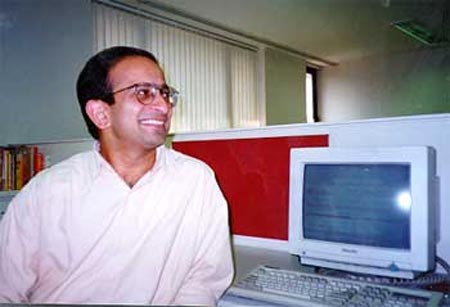
Drop us a line and our expert, Amit Bansal, will answer it.
Got a question for Amit Bansal? Please write to us at getahead@rediff.co.in with the subject line 'Career query for Amit Bansal.
Q: Is the demand for IT professionals going to fall? How are the salaries going to be impacted?
A: The demand for freshers in the IT industry will be lesser in 2010 as compared to 2009 and 2008 hiring. However, the demand will still be there.
There would be growing demand for professionals from core engineering in the coming 4 to 5 years. There would be more opportunities in manufacturing, biotechnology, automation, power, chemical and textiles amongst others. This year companies in the core sector like NTPC, DLF, Mangalore Refineries have offered salaries in excess of Rs 5 lakh whereas IT companies have paid salaries in the range of Rs 3- 4 lakh per annum.
Q: Hi. I am a final year engineering student. Can you please guide me on what kind of job I should look for?
A: My suggestion to you is that you should go for a stable start in the beginning of your career. Check the job profile. It should add value to your work experience. You choose a company where you can learn as well as contribute.
Q: In the current global economic slowdown scenario wherein the companies are cutting down on the number of fresh recruitments, how should I prepare myself to get a good job?
A: You should evaluate your skills like problem solving, communication and technical competence. Try to upgrade your skill set in relevance to the industrial requirements.
Amit Bansal is the CEO of PurpleLeap (https://www.purpleleap.com/) an employability skill enhancement initiative of Educomp Solutions Pvt Ltd.

Q: What kind of people do companies look out for during times of economic slowdown?
A: In such times, companies become very choosy. They look for graduates who are from a good college, have good grades and good knowledge. Basically they are looking for people for whom they have to invest very little in terms of training and who can become productive and start delivering value as soon as they join.
Q: Am an engineer and have been offered a job by a government company but on contractual basis. Though I am not averse to working in the government sector but this contract basis clause is confusing me. What should I do?
A: Government contracts people when there is a sudden requirement for more people on a specific project. These jobs are there only for the duration of the project and may not exist once project is over. Though these jobs are not secure as traditional government jobs but they are a good ground to build your work experience. Based on your talent and performance, you may either be absorbed in the government department itself or you can easily move to the private sector.
Q: I have two offers in hand. One is from a very reputed company and other is from a lesser-known company but with double the salary. What should I do?
A: My suggestion to you is that look for the job content first and not the salary. You should take up a job where you learn more and have chances of professional development. In such environment, you will be able to utilise your skill set to an optimum. It will ensure not only job satisfaction but better career growth as well. Money will definitely be more in the long run if you go by this criterion. :-).
Got a question for Amit Bansal? Please write to us at getahead@rediff.co.in with the subject line 'Career query for Amit Bansal.

Q: If I am not getting a job presently then should I consider higher studies as an option?
A: It is always a good idea to improve upon your education and get more skilled (more so in times of recession). But take care that it should match your interests and add value to your professional development. Also keep in mind the sectors in industry that can offer better employment to you before deciding upon the course.
Q: Which are the industries that are looking to hire presently?
A: Until last year, BFSI (banking, financial services and insurance) was the most sought after segment for employment. IT, the next most preferred segment, owed a pie of its growth to BFSI. But current economic meltdown has a severe impact on BFSI and indirectly on IT. Presently manufacturing sector with industries like pharmaceuticals, biotechnology, automotive, power, seems to be most promising.
With the new government focusing on infrastructure and education, related industries are likely to see an upward trend. Other than these, organised retail and IT sector are also likely to grow though at a lesser pace.
Q: What is the difference between 'employment ready' and 'ready to deploy' resource, as am hearing these terms more and more these days in industrial parlance?
A: 'Employment ready' means a student who has basic skills in place and can be hired by the industry. The basic skills are problem solving, communication, interpersonal and working knowledge of the technical domain.
'Ready to deploy' is a resource who can be directly put on client projects and doesn't need training. Such resources can start generating revenue for the company from day one of joining. In the present scenario, where organisations want to cut costs at every level, 'Ready to deploy' resources make a lot of economic sense and a preferred choice.
Got a question for Amit Bansal? Please write to us at getahead@rediff.co.in with the subject line 'Career query for Amit Bansal.

Q: Is there any way to get a new job?
A: You need to build your profile for an entry-level role. Do self-analysis and check whether your 'skill set' is in place for a company to hire you and directly put you on to the client side. Network (both online and offline) more to find opportunities. Get active on networking web sites and connect to your old college mates. Socialise, volunteer and attend events. Get involved with the growing number of job clubs and support groups. Exchange information on job leads and contacts. Circulate yourself as a job prospect.
Q: Is it advisable to go to US for job search?
A: I will advise against going to US and then searching a job there. However if you are going for higher studies and then want to find a job there, you can explore that. But please must keep in mind the reputation of the program and the university for which you are enrolling.
Q: Hi. I am a final year Electronics engineering student. I intend to pursue masters in the same but am little confused because of the current economic meltdown and the impact it had on IT industry affecting the recruitments adversely. Should I think of doing MBA instead?
A: I would say that you should do MBA only if your interest lies in management field. Otherwise you can try looking for a job first and have some work experience in a professional organisation. That will give you more clarity about your professional goals and aspirations and hence you can pursue higher studies. But at the same time be prepared with Plan B. In case you are not able to get a job at all or if you are very sure about doing masters first then do self-analysis, check your strengths and capabilities and hence take a right decision.
Got a question for Amit Bansal? Please write to us at getahead@rediff.co.in with the subject line 'Career query for Amit Bansal.

Q: I am a CSE final year student and want to go to Melbourne to do MBA. But in the backdrop of current racist attacks against Indians in Australia, would it be safe to go there?
A: I believe that you have already done some research work about the universities offering MBA programmes. I would say that safety is a relative term. One may not be hundred percent safe even at home also! So you should be more concerned about the merits of the programme and the reputation of the university above others. But at the same time there is no harm in looking at other possible options like a similar programme in other geography and may be in India itself. You can also think of taking up a job first and then pursue MBA after two years of work experience. This work experience counts a lot and if your 'skill set' is in place, it can help you get a seat with one of the premiere management institutes in India or abroad.
Q: Hi. I am a computer science final year student and am good in my field. I want to do specialisation but my only concern is that since worldwide IT industry is not in pink of health and recruitments are also poor, so would it be advisable to take up specialisation (masters) instead of doing job?
A: It is said that recessionary times are the best to pursue specialisation. You should go ahead with the same if your soul lies in it and there is no need to be concerned about the job. If you excel in your domain then getting a job should not be a problem at any time. The markets operate in a cycle -- whether human or financial. The demand for IT professions will surely be more again in future.
Q: Hi. I am an Economics final year student from a reputed university. I am preparing for MBA and exploring options (India and abroad). What should be my criteria while doing the selection?
A: I am sure that by now you would have prepared a list of institutes (India and abroad) wherein you intend to take admission. Your selection criteria should be mainly focused on the merits of the program that you wish to undertake and the reputation of the respective institute. You should compare apples to apples while making a final call.
Tier I institutes worldwide like Stanford and Wharton, Harvard Business School or London School of Business should be compared to IIM Ahmedabad, IIM Bangalore and likewise. Similarly Tier II institutes should be compared. Then you need to check the fee structure and the overall expenses expected to be incurred for the course and the stay abroad.
Got a question for Amit Bansal? Please write to us at getahead@rediff.co.in with the subject line 'Career query for Amit Bansal.